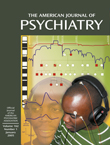Facial Expressiveness in Patients With Schizophrenia Compared to Depressed Patients and Nonpatient Comparison Subjects
Abstract
OBJECTIVE: Blunted affect is a major symptom in schizophrenia, and affective deficits clinically encompass deficits in expressiveness. Emotion research and ethological studies have shown that patients with schizophrenia are impaired in various modalities of expressiveness (posed and spontaneous emotion expressions, coverbal gestures, and smiles). Similar deficits have been described in depression, but comparative studies have brought mixed results. Our aim was to study and compare facial expressive behaviors related to affective deficits in patients with schizophrenia, depressed patients, and nonpatient comparison subjects. METHOD: Fifty-eight nondepressed inpatients with schizophrenia, 25 nonpsychotic inpatients with unipolar depression, and 25 nonpatient comparison subjects were asked to reproduce facial emotional expressions. Then the subjects were asked to speak about a specific emotion for 2 minutes. Each time, six cross-cultural emotions were tested. Facial emotional expressions were rated with the Facial Action Coding System. The number of facial coverbal gestures (facial expressions that are tied to speech) and the number of words were calculated. RESULTS: In relation to nonpatient comparison subjects, both patient groups were impaired for all expressive variables. Few differences were found between schizophrenia and depression: depressed subjects had less spontaneous expressions of other-than-happiness emotions, but overall, they appeared more expressive. Fifteen patients with schizophrenia were tested without and with typical or atypical antipsychotic medications: no differences could be found in study performance. CONCLUSIONS: The patients with schizophrenia and the patients with depression presented similar deficits in various expressive modalities: posed and spontaneous emotional expression, smiling, coverbal gestures, and verbal output.



